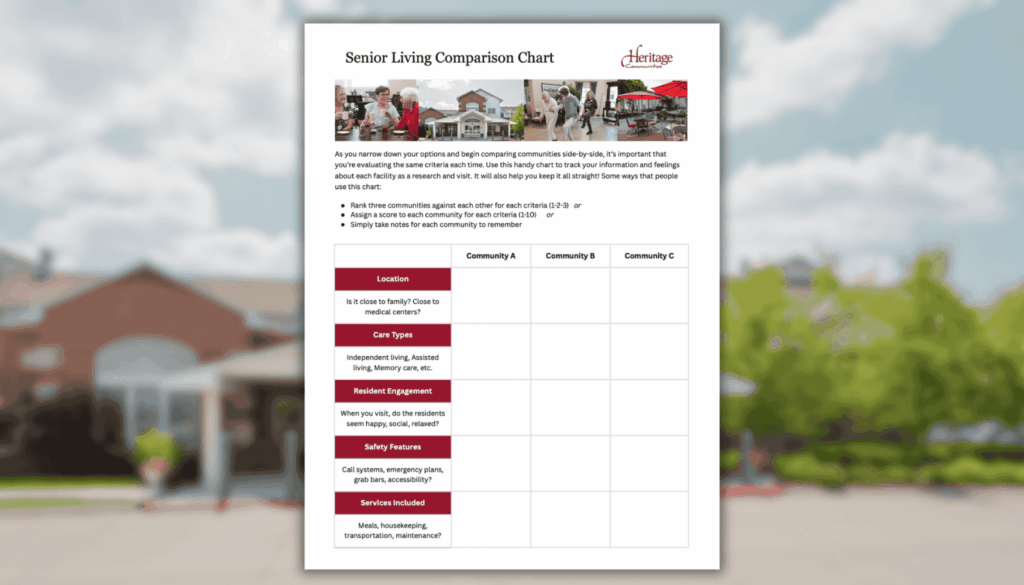Money Matters: 5 More Options for Paying for Senior Care
While you can’t put a price on happiness, you will have a lot more reasons to smile if you’ve secured a way to fund senior care or secure a retirement lifestyle. It may not seem possible when you first start researching your options, but in reality, there are several strategies for paying for senior care...

While you can’t put a price on happiness, you will have a lot more reasons to smile if you’ve secured a way to fund senior care or secure a retirement lifestyle. It may not seem possible when you first start researching your options, but in reality, there are several strategies for paying for senior care that many people don’t know about.
At Heritage, we are here to help you navigate the process and answer any questions you may have.
5 options to consider for paying for senior care
- Home equity loan. If you’re looking at costly medical charges for a severely ill parent, home equity lines of credit from multiple sources—you, your parent, a sibling or two—could be your best option as you consider ways of paying for senior care. Sometimes called a “second mortgage,” a home equity loan offers access to a large sum of cash drawn from the equity in your home. A home equity loan usually carries a fixed interest rate, making your monthly payments highly predictable.
- A reverse mortgage might help you move forward. Reserved for seniors 62 and older, this option can be a good choice for paying for senior care. A study released by the National Council on Aging (NCOA) shows that 13.2 million Americans are candidates for reverse mortgages. Money received from a reverse mortgage is tax free and does not interfere with Social Security retirement benefits or Medicare benefits.
A reverse mortgage may make sense for people who don’t plan to move, who can still keep up with the cost of home maintenance, property taxes and insurance and those who want to access the equity in their home to supplement income in retirement. Borrowers do not have to repay the money until they move and sell the home. This could be a good fit if one parent still lives in the home, or if you’re considering in-home care. If your parent never sells the home, the estate repays the loan.

- Sell your life insurance policy. One lesser-known method of paying for senior care is the life insurance settlement. You probably will receive less than the value of the policy, but still will make more than you would if you surrendered or abandoned the The purchaser takes over payment of the premiums. Policy value generally has to exceed $50,000. These funds are put into an irrevocable trust, which makes payments to the community. Then, you and your family can decide how much you want to allocate for care, and how much to set aside for inheritance. When proceeds of a life settlement are used for paying for senior care, tax deductions may apply.
- Attention Veterans: this option could be for you. If you are a Veteran, or spouse of a Veteran, you should know about this option for paying for senior living. Wartime Veterans and their surviving spouses, 65 years and older, may be entitled to a tax-free benefit called Aid and Attendance provided by the Department of Veteran Affairs. This benefit is designed to provide financial aid to help fund senior living by offsetting the cost of long-term care for those who need assistance with the daily activities of living such as bathing, dressing, eating, toileting, and transferring. To be eligible, you must meet specific criteria. Our Director of Sales can help you understand your eligibility.
- Don’t overlook long-term care Insurance. This form of Insurance is designed to help pay for costs of long-term care not covered by health insurance, Medicare, or Medicaid. Policies often even cover some homemaker services, such as meal preparation or housekeeping as long as it is in conjunction with the personal care services you receive. Not all long-term care insurance policies cover all services, nor do they all pay the same for similar services. Check your policy for details.
Paying for senior care: more options than you might have realized
Creating an actual plan and budget for paying for senior care lets you make choices and decisions, rather than leaving things to chance. Do your homework, talk it over with your family, and consult your financial advisor.
It’s a promise: Whenever you come to a Heritage Community, to live or to visit a loved one, you’ll feel as if you’ve come home. Download our free guide, The Complete Guide to Choosing Between Senior Living Options. Or contact us today.







